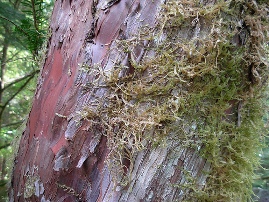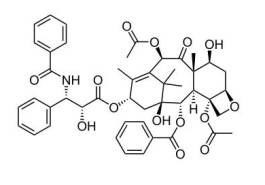Medical Uses
 At
one point in time the Pacific Yew was fairly unknown and
held little to no significance
in the medical field. That all changed when it was
discovered that the bark of the tree held a compound
that inhibits the growth of various cancerous tumors.
This compound was called Taxol and became an official
anti-cancer drug in 1992 under Bristol-Myers Squibb.
At
one point in time the Pacific Yew was fairly unknown and
held little to no significance
in the medical field. That all changed when it was
discovered that the bark of the tree held a compound
that inhibits the growth of various cancerous tumors.
This compound was called Taxol and became an official
anti-cancer drug in 1992 under Bristol-Myers Squibb.

The story of Taxol starts in the 1960s when the National
Cancer Institute’s search for compounds with anti-cancer
properties was well underway. The NCI had several people
roaming the countryside taking samples of different plants that
were sent back to labs in order to test them for these special
properties. In August of 1962, along with three assisting
students, Arthur Barclay took samples of the Pacific Yew in a forest outside of
a small town in Oregon. The sample including twigs,
leaves and fruit was sent to the Wisconsin Alumni
Research Foundation for testing. On May 22, 1964 it was
found that the extract from the stem bark of the tree
was active against the KB cell line. In 1971 it was
found that Taxol was the compound that was responsible
for the anti-cancer properties. During the 1990’s, it
was being found that Taxol was an effective inhibitor of
the growth of some cancers including ovarian cancer and
carcinosarcoma.
 Initially,
it was expected that the collection of bark from the
trees would create publicity and help the economy of the
areas in which the trees are found. It was thought that
this would aid in the conservation of these areas as
well. For awhile, there was quite a political uproar
about the conservations of the old-growth forests where
the Pacific Yew is found. With all of the political
turmoil, Bristol-Myers Squibb decided to go elsewhere
for their supply of Taxus brevifolia bark.
There have also been attempts to create a synthetic
Taxol but, as of today, they have all been unsuccessful.
Initially,
it was expected that the collection of bark from the
trees would create publicity and help the economy of the
areas in which the trees are found. It was thought that
this would aid in the conservation of these areas as
well. For awhile, there was quite a political uproar
about the conservations of the old-growth forests where
the Pacific Yew is found. With all of the political
turmoil, Bristol-Myers Squibb decided to go elsewhere
for their supply of Taxus brevifolia bark.
There have also been attempts to create a synthetic
Taxol but, as of today, they have all been unsuccessful.
To learn more about another really neat organism that's involved in cancer treatment, check out the Pennsylvania firefly, Lingzhi mushroom, or Black Pepper!
If you want to find out some information about the author, take a look at the Contact Me page.